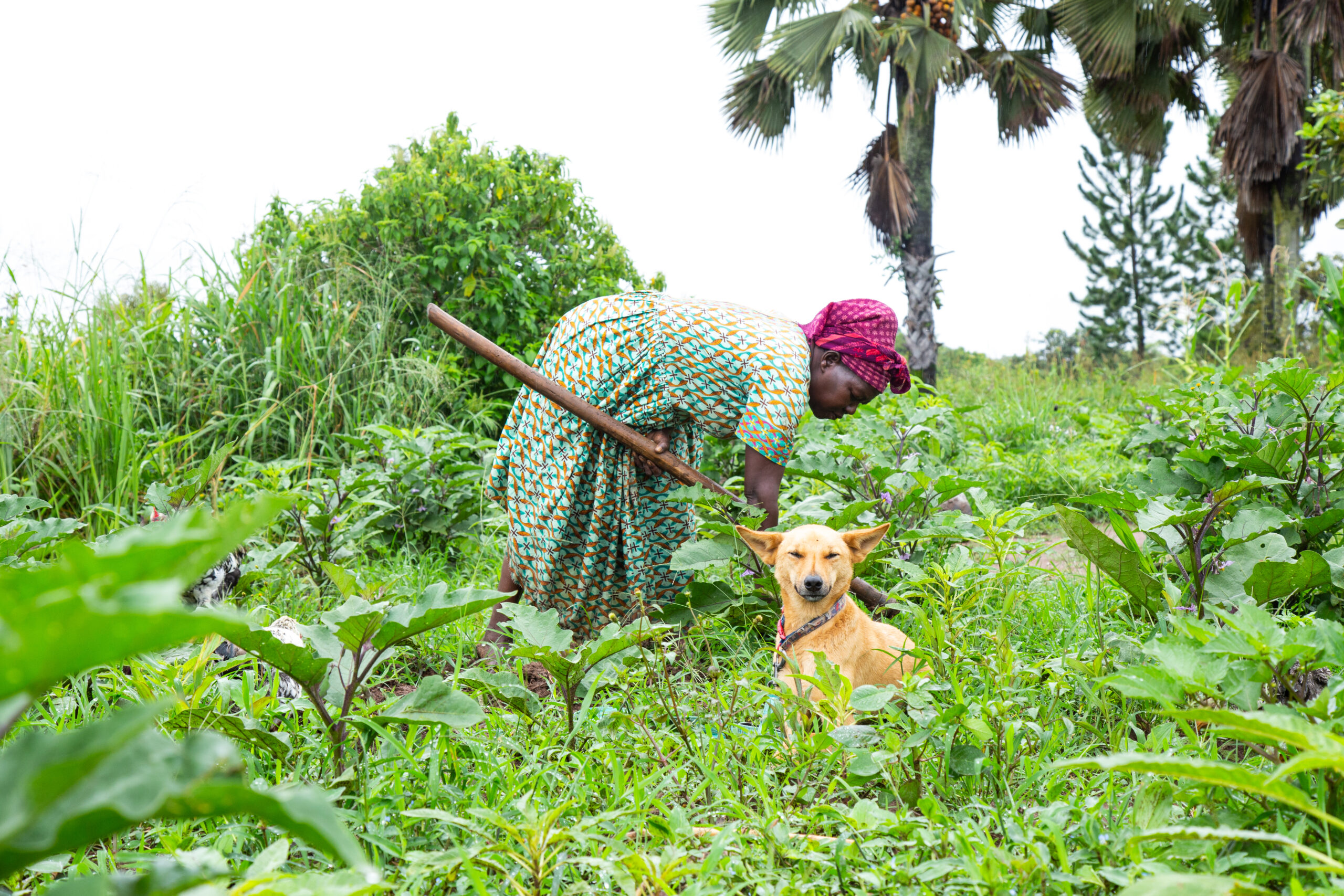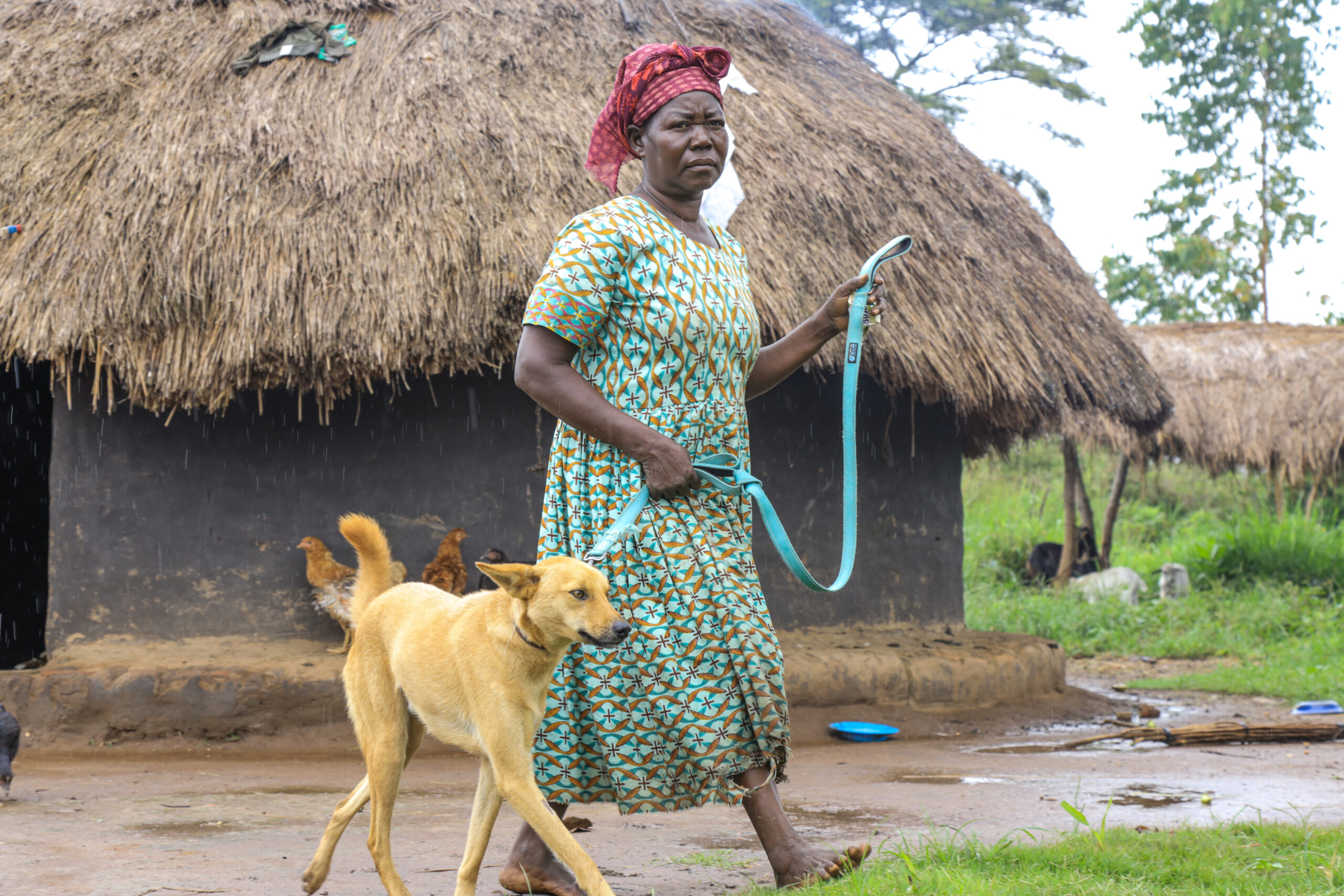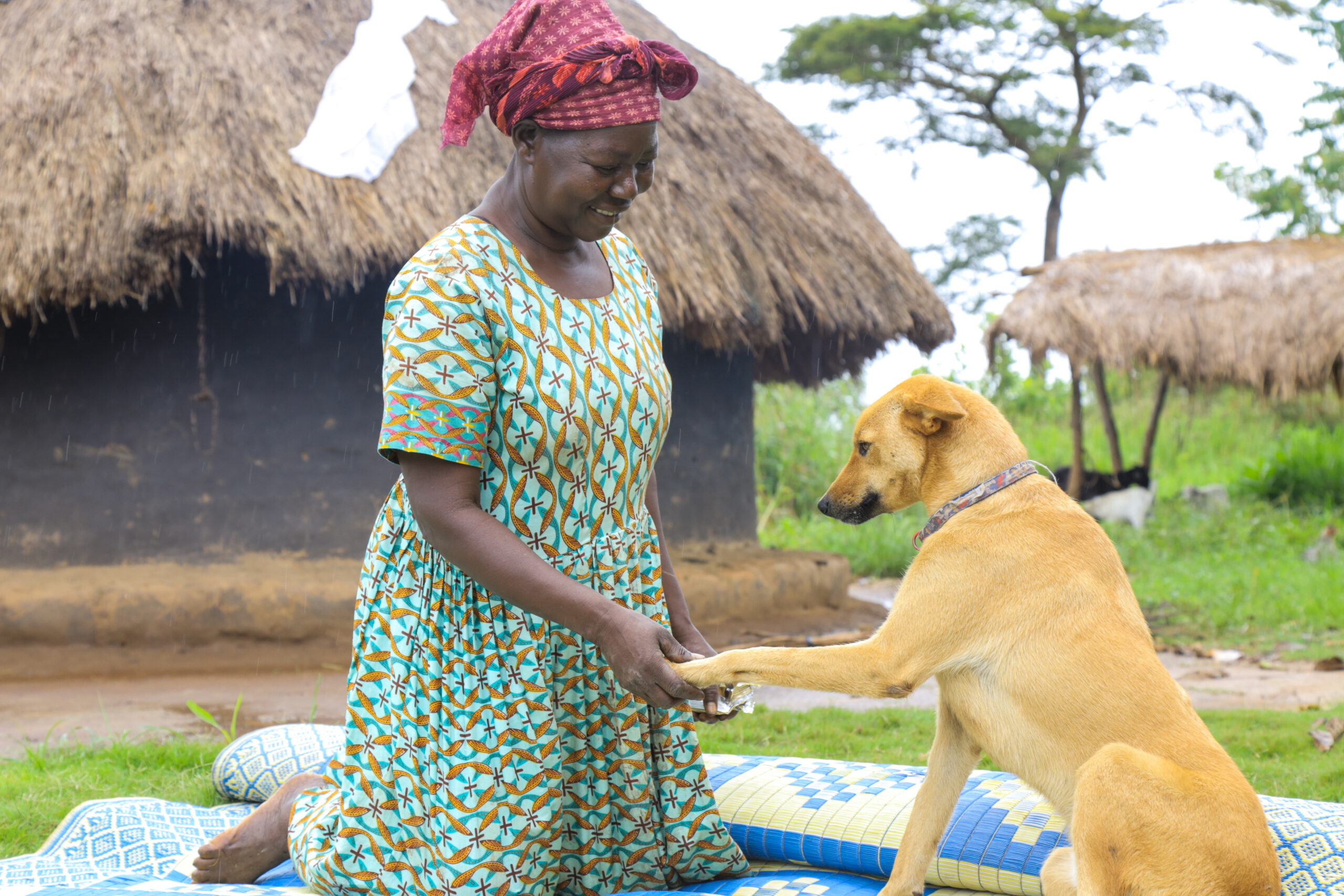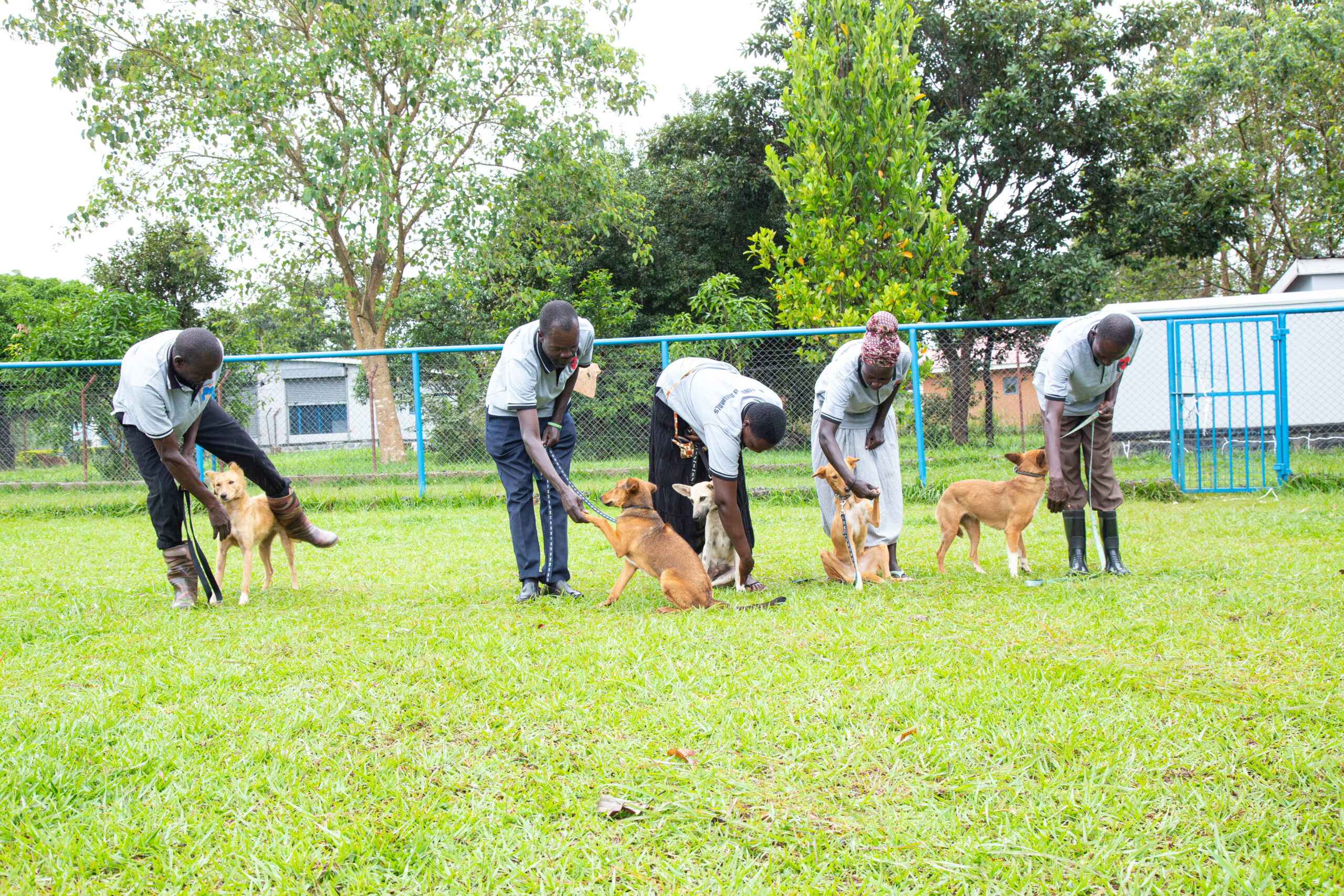In northern Uganda, war survivors and comfort dogs are “healing together.”
- Rehabilitated stray dogs and survivors of a decade long war in Uganda who grapple with trauma have formed a bond geared towards healing.
Gulu, Uganda (Minority Africa) — It’s 11 AM on Saturday at the headquarters of Big Fix Uganda, an organization specialising in treating and rehabilitating stray dogs. In the tranquil compound, Evelyne Anena is seated on a mat, tenderly stroking a dog called Peyot. The atmosphere is serene as Peyot, with closed eyes, luxuriates in each soothing stroke. The dog reciprocates the connection by placing its paw in Anena’s hand, creating a touching moment.
Periodically, Peyot lifts its head, acknowledging and cherishing Anena’s comforting touch. In the background, the distant sounds of other dogs echo from inside one of the buildings on the compound.
The bond shared between Peyot and Anena is one of profound interdependency. This connection had its roots in 2021 when Anena sought solace in the organization, looking for counselling to navigate the trauma she endured after losing her husband to the Lord Resistance Movement (LRA) rebels.
“On the night of July 2002, rebels came into our home, grabbed my husband and killed him in front of me and my children,” the 50-year-old Anena recalls. ”For almost twenty years, I could not sleep because every time I closed my eyes, I re-lived my husband’s murder.”
Following that fateful day, life took a turn for the worse for the mother of four. Prior to her husband’s demise, he served as a policeman and was the primary breadwinner for the family. The family was forced to flee their home and seek refuge in Gulu Town.

Anena and their children found themselves in dire circumstances. She faced the daunting task of rebuilding her life and ensuring the well-being of her family.
“I would ride my bicycle for a long distance from the camp to the village to gather food to feed my children and the balance I would sell to get money for bills like school fees and clothes.”
In 2008, when the dust settled, Anena and her children returned to their home. However, in the absence of her late husband, her in-laws conveyed to her that she could no longer reside there, asserting that, as a woman, she had no rights to the land.
“They wanted me to leave with my children and go back to my parents’ home. However my parents and two of my siblings were also killed by the rebels so I did not really have anyone to go back to,” Anena narrates.
“I struggled with my in-laws until we were given some land; that is how I managed to survive. But some of that land has already been taken since then.”
Peyot
In 2021, Anena joined Big Fix Uganda. In the beginning, she wanted counselling services. During the sessions, she was paired with Peyot, a dog which was also going through trauma of its own.
“Peyot in Acholi means ‘It’s not easy.’ I gave it that name because of what we both had been through,” Anena says, looking at Peyot who is now sleeping beside her. Peyot opens its eyes, looking at Anena as though in agreement. “After starting counseling and meeting Peyot, I was able to sleep well within the first three weeks.”
The relationship between Anena and Peyot is exactly what the Comfort Dog Project set out to create when the project started in 2014.

According to Francis Oloya, a community psychologist and manager of the Comfort Dog Project and education program at Big Fix Uganda, they majorly employ animal-assisted interventions that use dog therapy for treating and rehabilitating the mental health of war trauma survivors.
“Northern Uganda has been a place where we experienced decades of war between the LRA and the Uganda government which has left thousands of people suffering from the effects of the war up-to-date,” Oloya says.
However, for Oloya, his involvement in the Comfort Dog Project serves as a personal testament to the profound impact dogs can have on someone’s life. Oloya, who is visually impaired, forged a meaningful connection with two dogs belonging to a neighbour during his high school years
“[The dogs] instinctively came to know that I needed help and whenever I left the dormitory to class, they would come and lead me and help me navigate especially in the night,” Oloya says while petting his comfort dog Bailey who sits at his feet nervously looking around.

During that period, Oloya found solace in his canine companions when he couldn’t garner support from his fellow students who were also grappling with the stress of school. Every time he ventured out with his white cane, the dogs would come running, offering him the companionship and support he needed.
“That was the situation of helplessness I was going through. I felt that I needed someone to be there for me, and these dogs came to the rescue time and again. I felt safe,” Oloya says.
Throughout the remainder of his high school years, Oloya continued working with the dogs. He finished school and joined the university where he earned a bachelor’s degree in community psychology.
Upon completing his university degree, Oloya returned to northern Uganda, where he crossed paths with Sarah Smith, the president of Big Fix Uganda. Originally founded as a charitable organisation, Big Fix Uganda aimed to foster the bond between animals and humans, promoting both physical and mental well-being.

“We came to the understanding that dogs can help people and that is how the Comfort Dog Project was born,” Oloya says.
Pet therapy builds on the pre-existing human-animal bond. Studies show that interacting with a friendly pet can help many physical and mental issues.
Big Fix Uganda has worked and consulted with the Warrior Canine Connection (WCC) in the USA, which also uses dog therapy to help war veterans who are struggling with PTSD (post-traumatic stress disorder).
Since the program’s initiation, Big Fix Uganda has successfully trained approximately one hundred dog guardian teams. Currently, there are eighty-two active members who continue to work alongside the comfort dogs of which 70% are women who are still dealing with the effects of the LRA rebel activities in the region.
According to a report by the United Nations Populations Fund (UNFPA), women and girls bear a disproportionate impact during times of war. The psychological, reproductive, and overall well-being of women is frequently severely compromised in conflict situations. Conflicts tend to escalate the occurrences of sexual violence, rape, sexually transmitted infections (STIs) such as HIV/AIDS, and unwanted pregnancies among women and girls.
Pairing
To ensure the program produces effective outcomes, the pairing of the dogs and their companions undergoes a rigorous process.
Initially, beneficiaries of the Comfort Dog Program are identified within communities through engagements with residents and consultations with village leaders focusing on trauma and mental health disorders.
Potential candidates then undergo assessments using depression tools such as the Post Traumatic Scale Intervention (PRSI) and Beck Depression Inventory (BDI). These tools help evaluate the severity of mental health conditions, providing crucial insights into the individuals’ needs.
“All the dogs used in the program are rescued as well,” Oloya says. “Most of them have had guardians, some also suffered some trauma like motorcycle and vehicle accidents, others had been trapped by metallic traps and sustained injuries. Others went through tough conditions where stubborn community members subject them to serious wounds by stoning them.”
When the dogs are rescued, they are taken first to a hospital for veterinary care and vaccinated before they are rehabilitated.
“Then we give them the temperaments test to check whether the dog is friendly, if they are able to socialise and can also work with a person,” Oloya explains. “Temperament tests check if the dog is fit for the program.”
According to Oloya, as the pairing is conducted within village communities, an additional assessment involves a prey drive test for the dogs. This test gauges whether the dogs exhibit a tendency to chase or harm other animals, such as chickens. “To see if we can manage this behaviour before the dog is paired with someone.”
Once the dogs have successfully undergone these tests and are deemed suitable for pairing, Oloya elaborates on the complexity of the next step. The pairing of dogs and guardians involves a thorough compatibility assessment. Several factors are taken into consideration, including the dog’s behaviour around the potential guardian, the age and appearance of the dog in relation to the guardian, the specific needs of both the dog and the guardian, and whether the two share common traits such as playfulness.
 “We also do inspections to check if the home is ready for the dog; like if the home has a kennel, if family members are ready to receive the new member and if the neighbourhood is safe for the dog,” Oyola says with a hint of concern.
“We also do inspections to check if the home is ready for the dog; like if the home has a kennel, if family members are ready to receive the new member and if the neighbourhood is safe for the dog,” Oyola says with a hint of concern.
For Anena, the untimely death of her husband and the ensuing instability meant that her children missed out on an opportunity for a better life. She believes that these circumstances prevented her from providing her children with the education they needed to enhance their prospects and improve their lives.
“Today my children have no jobs. The two girls stopped at Senior Four and are married now and the boys stopped in Senior Two. They are peasants and live at home with me,” Anena says.
However, she always looks forward to Saturdays, when people and their comfort dogs gather for training sessions, participating in various activities including grooming and cleaning the dogs, mastering obedience training tricks, and annually participating in dog games on October 4 in celebration of World Animal Day with Peyot.
“Peyot was abandoned and homeless. We are now healing together,” Anena says and Peyot looks up at her as if in agreement.
Edited by Caleb Okereke and Uzoma Ihejirika.
PK Cross is a journalist at large at Minority Africa.

